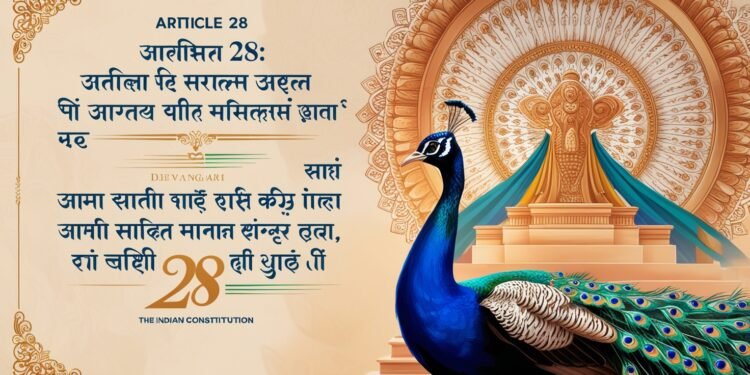Ananya Singh
WHAT IS SECULARISM?
When individuals do not rely on religion for forming decisions, policies, managing their lives, shaping their relationships, or motivating their actions, it is known as secularism, as explained by a notable humanist and author, Jim Herrick.
India is a diverse country with many religions and traditions. During the making of the Constitution, our Constitution makers agreed that India needed to function as a country with respect for all religions, where people from different religious and cultural backgrounds could coexist peacefully. K.T. Shah, during the seventh volume of the Constituent Assembly Debates in 1948, raised the issue of inserting the words “secular, federal, and socialist” in Clause 1 of Article 1 of our Constitution. However, it was not until 1976 that the term “secular” was added to the Preamble by the Indira Gandhi government through the 42nd Constitutional Amendment Act.
India does not have an official state religion, and all faiths are treated fairly and equally. They are all equal before the law. Our Constitution guarantees the fundamental right to freely practice any religion, and it ensures government impartiality in religious matters. It upholds the distinction between the functions of the state and religion. The Supreme Court in the landmark case of S.R. Bommai vs. Union of India (1994) held that secularism forms an essential component of the Constitution’s basic structure.
RIGHT TO FREEDOM OF RELIGION
India is home to the largest population in the world, with each person potentially following different ideologies. Religion and culture are deeply ingrained in Indian society. Therefore, our Constitution makers aimed to create a society where everyone is free to follow the religion of their choice. Articles 25-28 of the Constitution guarantee the right to freedom of religion.
- Article 25 grants individuals the freedom to follow, practice, and disseminate their beliefs.
- Article 26 gives religious organizations the authority to manage their own matters.
- Article 27 ensures that no one is required to pay taxes explicitly to promote any religion.
- Article 28 safeguards students’ rights in educational institutions by prohibiting forced engagement in religious services or instructions.
Collectively, these articles support the values of equality for all and religious freedom for everyone.
ARTICLE 28
Article 28 guarantees freedom regarding attendance at religious instruction or places of worship in certain types of educational institutions. This article classifies educational institutions into categories:
- Institutions fully supported by the State: No religious instructions may be imparted.
- Institutions acknowledged by the State: Religious instructions are allowed only with the individual’s consent or, if a minor, with the permission of their guardian.
- Institutions founded under a “trust or endowment” and managed by the State: Religious instructions are allowed if the “trust or endowment” requires it.
Clause (1) prohibits any religious instruction in educational institutes fully funded by the State. However, Clause (2) exempts institutions founded under a “trust or endowment” that requires the offering of religious instruction, even if they receive full financial support from the State. Clause (3) further stipulates that no person enrolled in such institutions may be forced to attend religious services within the premises or to participate in any provided religious teaching.
Article 28 combines ideals of secularism and religious freedom by laying down guidelines for religious instruction in educational institutes. It draws a clear line between government functions and religion, protecting the rights of students from diverse religious backgrounds and ensuring that educational institutions maintain a secular nature.
Landmark Cases
-
D.A.V. College vs. State of Punjab: Section 4 of the “Guru Nanak University Act” was challenged on the grounds that it violated Clause (1) of Article 28. The Court held that the provision encouraged academic study of Guru Nanak’s life and teachings, not a particular religion, and did not violate Article 28.
-
Aruna Roy vs. Union of India: The petitioner contended that the “National Curriculum Framework for School Education (NCFSE)” violated constitutional provisions as it was anti-secular. The Court held there was no violation of Article 28 since there was no prohibition against studying religious philosophy to promote value-based living.
CONCLUSION
Our Constitution ensures that each individual can live freely, following the religion of their choice. As a secular country, it is the duty of the State to separate itself from religion. In a country as diverse as India, promoting peace and harmony requires that the State avoids endorsing any specific religion. Article 28 exemplifies this balance, ensuring that state-run educational institutions operate with secular values while protecting individual freedom to practice religious beliefs.
REFERENCES
- Diksha Paliwal, “Article 28 of the Indian Constitution” (Ipleaders, January 12, 2023) Link
- Sachi Ashok Bhiwgade, “Right to Freedom of Religion: Articles 25-28 of the Indian Constitution” (Ipleaders, January 21, 2020) Link
- Milind Parab, “Freedom of Religion under Indian Constitution” (Manupatra Articles, March 17, 2022) Link
- V.N. Shukla, Constitution of India (14th edn, 2022)
- Sabyasachi Bhattacharya, “Secularism and the State” (Frontline, The Hindu, January 20, 2016) Link
- (1971) 2 SCC 368
- (2002) 7 SCC 368
- (1994) SCC (3) 1



